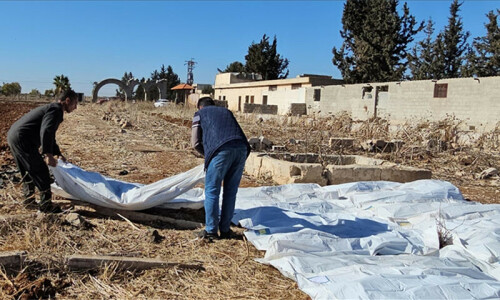
KABUL: British Prime Minister David Cameron called on Afghanistan and Pakistan on Thursday to make a joint effort against insurgents in the two countries' border zone. He also expressed confidence that Afghan forces will be able to hold their own after the majority of foreign troops leave at the end of 2014.
Cross-border fighting and the stalled Afghan peace process were the main topics of discussion at a three-way meeting in Kabul between Pakistani Prime Minister Raja Pervaiz Ashraf, Afghan President Hamid Karzai and Cameron.
The British, US and Afghan governments have long criticised Pakistan for not doing enough to stop cross-border attacks. Many insurgents groups are based in safe havens in Pakistan's lawless tribal areas along the Afghan border. Islamabad also charges that insurgents cross the border from the Afghan side and attack Pakistani security forces.
''The terrorists that are trying to wreck Afghanistan are by and large the same terrorists that are trying to wreck Pakistan,'' Cameron said.
''We should be together in one single fight.''
Britain's involvement could help America's effort to push Pakistan to crack down on the safe havens and also to use its connections with some Taliban leaders to promote peace talks.
Britain also sees the border areas as a main base for terrorists planning attacks against the West, although Cameron said that less than half of terrorist plots against Britain now originate from Pakistan's border regions — down from two-thirds as recently as 2010.
Three men were charged Wednesday in London with travelling to Pakistan for terrorist training.
''We are making progress, and this is our fight as much as your fight and the Pakistanis' fight,'' Cameron said.
Pakistani Prime Minister Raja Pervaiz Ashraf, who took office last month, and Karzai were also holding separate talks together.
His spokesman, Akram Shaheedi, said the prime minister also plans to push the Afghan government to stop militants from its country from infiltrating Pakistan.
Ahead of the visit, Shaheedi said Pakistan supports peace talks with the Afghan Taliban, but the outcome should not adversely affect the country.
The Taliban has refused peace talks with Karzai, calling him a puppet of the United States. Instead, they have held talks directly with American officials.
They broke off talks earlier this year, saying the US reneged on a promise to release Afghan prisoners from Guantanamo Bay. The talks have so far shown no signs of restarting.
Pakistan is seen as key to breaking this impasse because of its historical ties with the Taliban.
''The peace process is the most important of our pursuits for Afghanistan. It remains the highest priority,'' Karzai said.
Karzai said having talks among the leaders of Pakistan, Afghanistan and Britain was Cameron's idea and that there had been minister-level meetings among representatives of the three countries.
''Today is the first time that we are sitting at the high-level of the leaders,'' Karzai said.
''The purpose of the meeting is to find an effective way to battle against terrorism and what role Pakistan can play now in the security situation in the region and the peace process.''
The Kabul talks marked the end of Cameron's two-day visit to Afghanistan, intended to guide decisions on how fast Britain will withdraw its 9,500 troops before international forces leave by the end of 2014.
In separate talks with Karzai, Cameron discussed the drawdown. He also planned to stress the need for ''credible, inclusive and nationwide'' presidential elections in 2014, his spokeswoman said, on customary condition of anonymity in line with policy.
Cameron also met in Kabul with the top US commander in Afghanistan, Gen John Allen, who gave him a positive message on the country's overall security picture as they discussed recent violence in northeastern Afghanistan.
Allen said the process of handing security duties to local forces was progressing well, though the Afghan army still needs to improve its command and control capabilities, Cameron's spokeswoman said.
Cameron rejected claims Afghanistan could be mired in violence once foreign troops withdraw, insisting local forces are prepared to handle insurgents.
Taliban fighters should ''be in no doubt that there is a very clear and strong plan to transfer lead security responsibility from very capable (Nato-led) Isaf forces, including British forces, to very capable Afghan forces,'' he said.
''I am content that they will be able to defeat an insurgency and that Afghanistan will have a secure future,'' Cameron added. ''Of course we would make even further progress if there were to be successful political talks and if the insurgency was to come to an end on that way.''
Although fighting has not abated in the south, it has escalated in the east where coalition forces have focused their efforts against insurgents.
Nato said two of its service members were killed by roadside bombs in eastern Afghanistan. It provided no other details, but the killings brought the death toll among foreign troops to 27 so far this month and 242 this year.
In other violence on Thursday, a roadside bomb in northwestern Faryab province killed eight civilians and wounded six others, a spokesman for the governor said. They were in a mini-bus headed on a shopping trip one day ahead of the start of the holy month of Ramadan.
Cameron also discussed the issue of "green-on-blue" killings on Wednesday in Helmand, southern Afghanistan, where British forces are mainly based. The term refers to the targeting of Nato troops by Afghan members of the security forces. There has been a rash of such killings in the last years.
He and Karzai also signed an agreement for 90 British military officials to staff an Afghan army officer training academy to be opened near Kabul. A total of 30 Danish, Australian and New Zealand soldiers also will staff the center, due to open before international forces leave at the end of 2014.
"I believe this is an important step for the Afghan people, this means having a stronger Afghan army, which is better trained, equipped and skilled," Karzai said.











































